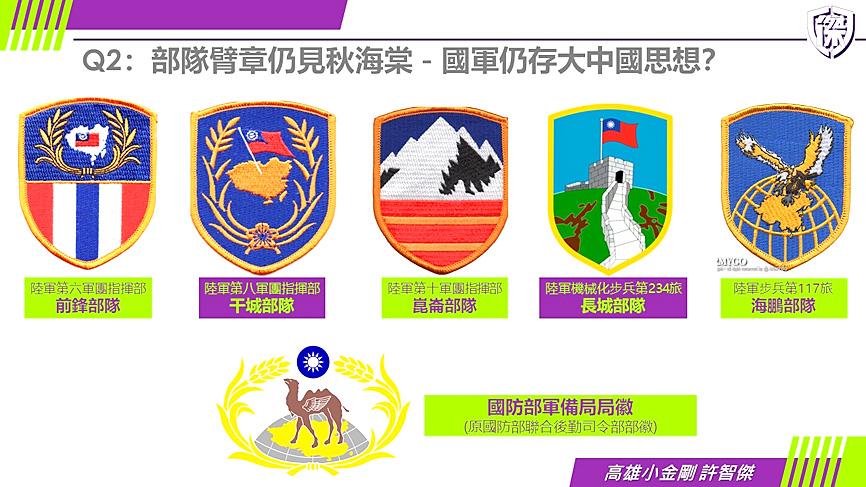Democratic Progressive Party Legislator Hsu Chih-chieh (許智傑) yesterday questioned the use of the “begonia” map in the armband insignia of some branches of the military.
The “begonia” map, so named because it resembles a begonia leaf, depicts an extended swath of pre-1949 Republic of China (ROC) territory, which notably includes Outer Mongolia.
Hsu said the use of the “begonia” map in the insignia symbolizes a “greater China mindset,” and urged the military to change it.

Graphic courtesy of the office of Democratic Progressive Party Legislator Hsu Chih-chieh
New insignia could use images symbolic of Taiwan, such as the Formosan black bear or the Taiwan blue magpie, Hsu said.
Hsu was speaking at a meeting of the legislature’s Foreign Affairs and National Defense Committee, suggesting a review of the stipulations in the Armed Forces Uniform Act (陸海空軍服制條例) and other relevant laws.
Hsu compared the issue to past discussions about the Chinese Nationalist Party’s (KMT) emblem, which has been said to closely resemble the national emblem, and is therefore no longer appropriate as Taiwan is no longer a one-party state.
Similarly, the military armband insignias do not reflect the current situation in Taiwan, he said.
Military insignias also do not need to incorporate the national emblem, he said, citing US military insignia, some of which do not use the bald eagle.
Army Lieutenant General Fang Mao-hung (房茂宏) said the use of the map in the insignia was in accordance with the national territory described in the ROC Constitution.
The map includes territory effectively under the government’s administration, as well as that constitutionally recognized, but not under the government’s administrative control, he said.
“The entire military is loyal to the nation, loyal to the Constitution and executes orders in accordance with the law. This must not be questioned,” he said.
Hsu asked why the insignia used by the Republic of China Marine Corps still uses the “begonia” map, despite being redesigned in April 2019.
Military insignia should not be bound to tradition, which would cause divisiveness, Hsu said.
He also cautioned against the use of the national emblem on the hats of military personnel, saying its resemblance to the KMT emblem could cause confusion.
“There is no problem with the military being loyal to the Republic of China, Taiwan. However, it should consider more neutral designs for emblems to avoid ideological problems,” he said.

SHIPS, TRAINS AND AUTOMOBILES: The ministry has announced changes to varied transportation industries taking effect soon, with a number of effects for passengers Beginning next month, the post office is canceling signature upon delivery and written inquiry services for international registered small packets in accordance with the new policy of the Universal Postal Union, the Ministry of Transportation and Communications said yesterday. The new policy does not apply to packets that are to be delivered to China, the ministry said. Senders of international registered small packets would receive a NT$10 rebate on postage if the packets are sent from Jan. 1 to March 31, it added. The ministry said that three other policies are also scheduled to take effect next month. International cruise ship operators

HORROR STORIES: One victim recounted not realizing they had been stabbed and seeing people bleeding, while another recalled breaking down in tears after fleeing A man on Friday died after he tried to fight the knife-wielding suspect who went on a stabbing spree near two of Taipei’s busiest metro stations, Taipei Mayor Chiang Wan-an (蔣萬安) said. The 57-year-old man, identified by his family name, Yu (余), encountered the suspect at Exit M7 of Taipei Main Station and immediately tried to stop him, but was fatally wounded and later died, Chiang said, calling the incident “heartbreaking.” Yu’s family would receive at least NT$5 million (US$158,584) in compensation through the Taipei Rapid Transit Corp’s (TRTC) insurance coverage, he said after convening an emergency security response meeting yesterday morning. National

PLANNED: The suspect visited the crime scene before the killings, seeking information on how to access the roof, and had extensively researched a 2014 stabbing incident The suspect in a stabbing attack that killed three people and injured 11 in Taipei on Friday had planned the assault and set fires at other locations earlier in the day, law enforcement officials said yesterday. National Police Agency (NPA) Director-General Chang Jung-hsin (張榮興) said the suspect, a 27-year-old man named Chang Wen (張文), began the attacks at 3:40pm, first setting off smoke bombs on a road, damaging cars and motorbikes. Earlier, Chang Wen set fire to a rental room where he was staying on Gongyuan Road in Zhongzheng District (中正), Chang Jung-hsin said. The suspect later threw smoke grenades near two exits

Taiwan has overtaken South Korea this year in per capita income for the first time in 23 years, IMF data showed. Per capita income is a nation’s GDP divided by the total population, used to compare average wealth levels across countries. Taiwan also beat Japan this year on per capita income, after surpassing it for the first time last year, US magazine Newsweek reported yesterday. Across Asia, Taiwan ranked fourth for per capita income at US$37,827 this year due to sustained economic growth, the report said. In the top three spots were Singapore, Macau and Hong Kong, it said. South